Floors of contemporary art
The Center of Modern Art in Genève is located in a building of former factory. As wrote in the beginning of the last century, these spacious light shops of a glass and concrete are nowadays almost ideal for display of modern art. The exhibition of modern art of Central Asia under the name "Trans-forma" is on display on all three floors of this magnificent building. The exposition begins at the fourth floor, on which, according to curator's idea, settles down the «documentation», i.e. work of the artists somehow describing occurrence and development of new directions in the art of Central Asia. This section includes the photos from installation by Vyatcheslav Akhunov made in desert Kyzyl-Kumy in 1987, and also the film by Shai-Zia «Antibutya» (1992), and fragment from film about the «Green Triangle» group by the director Aisha. Besides, on the fourth floor were placed the cycles of photos by Yuri Ratushenko about Civil war in Tajikistan and photos by Shailo Dzheksenbaev under the name «The Future of one illusion». The origin of video art was represented with work of Alexander Malgazhdarov «Talkings», and as development of a documentary video - «Experience of Cross» by Vladimir Tulkin and Taras Popov. The exposition of the third floor opened almost by personal exhibition of Erbosyn Meldibekov. Directly with «threshold» the spectator got in cozy interior-environment under the name «Eastern hospitality». Walls decorated with eastern plates and suzane, attached to a table with stools and TV set. Each plate covered with intricate eastern pattern, except for ornament, had at itself (or on itself?) entered in the central field and others oriental motives, as that: portraits of Turkmenbashi, donkeys and camels, (last two - are heavy laden with cannon installations), circuits of assembly and cleaning of automatic devices and guns. The same plates, kese and lyagans filled a table, but here they served not as ornaments, and on the contrary, full, were to attract by various exotic fruits, in particular, pomegranate, on each of which was an inscription in clear Iraq language, in translation meaning «Welcome». The TV set, located in a corner, also was called to pleasant leisure, showing to the amazed spectator eastern auto portrait physiognomy in skullcap, which an unknown character masterly owning the Mongolian language, not interrupting, lashed on cheeks. In grandiose space to the right of cozy kitchen of Erbol towered one of key and major work in the Kazakhstan art of last years, that of the same author - famous «Monument to the hero». Four horse legs, settled on high Roman pedestal, in the middle of empty hall on bar floor showed themselves as a symbol of firmness of our independence, stateness, democracy and other basic achievement. On walls in avaricious selection but large format have settled the photos by same Malgazhdarov, all that down: two profiles, pointing to each other by means of pistols, jutted out of their mouths, head of the man dug in ground between (own?) feet, same heads, but beautifully and rhythmically located between sharp stakes, also dug in ground, well etc. Further behind the area of Erbosyn Meldibekov spread Khakim Turdyev's the hydrochloric fields, on which, as against present Aral, it's impossible to go, because it's the work of art - nevertheless, and, if to come off terrible sense, very beautiful and thoughtful. All at our East is beautiful! Even dead horses and seas! Turning back, you will come across the large dark hall, in which is demonstrated the video work by Said Atabekov "Cautiously! Anti-infantry mines". It is black-and-white rhythmical record of circulations of the author on a circle around of three stones, his shaking out a dust from a carpet with three mark-symbols of three religions, the game with own image of dervish, which clears the earth from all disgust and abominations, brought by the people. Most tremendous in this work by Atabekov - absolute concurrence of music (and the author at all can not recollect, whence he has taken it) - that, certainly, according to strict rules of the copyright it is inadmissible) and its dramatics represented, just that case, when one's not "supplement to another"; it is simple one whole, organic and entire. It is impossible to imagine that the given music at one time existed without the given videoline. The name of work is taken from an inscription on a dressing gown of dervish, and, though anti-infantry mines are the terrible disaster already and in our country, and in Central Asia - it is valid if to simply recollect how many shepherds, not speaking of cattle, was lost on borders of Kyrgyzstan and Uzbekistan, the work of Said Atabekov may be about global threat to all our Earth, which unique originator is man himself, littering by the military and industrial wastes, idiotic-economic projects, aggressive ideas and actions a unique place in the universe, where he can live. Henceforth this man cannot freely move on his own ground - Cautiously! Anti-infantry mines! Coming back through Meldibekov's "Eastern hospitality", at the left side you will come across cozy silent "House" of G. Tryakin-Bukharov- actually, nest made from a barbed wire serving as continuation and development of a theme "Beyond the form". The pressure for the spectator falls down a little, when he leaves in next terrain with the large installation by Shaarbek Amankulov "Altar". One is laid out as a glass rectangular directly on a floor, the glasses press by themselves thousand coins of the Soviet era. In the central field - mountain of asyks in a border of mirror squares. The artist treats his work in mystic-spiritual sense, interfacing it with traditional tradition and metaphysical metaphysics. In a context of the exhibitions "Trans-forma", the idea of socialization and poetization of a sacred altar comes back to initial idea primitive altar, to which all can be assigned - and extremely for the sake of dead money, which early or late become children's toys. Here on a wall hangs the cycle of photos by E. and V. Vorobyev "Sunsets, dawns", in which it is told with humour and satire about ways of a self-defense of our population from the undesirable visitors - for example, thieves, as lattices at windows. At the same time, despite of this symbol of constant threat not less constantly presenting at a sight from any of post-soviet window into the world, the population has invented also something like a consolation for itself - lattice at windows, as the artists have noticed, are usually executed as children's figure representing the sun with radiant beams. There is such ancient prison song "the Sun rises and sets, and in prison of mine is darkly" . Vorobyev pair has found such lattice even among buildings of Moscow Kremlin. Nevertheless, the element of self-irony, marked by the artists, is that most, that is "beyond the form". It is amusing, that the humour of a situation a long time did not reach up to safe Swisses. They naively considered that the key to understanding of a series is one of photos with the image of a warped gate, for which is seen not less warped tractor. That is symbolized our multidifficult everyday lives and criticism of our modern reality. And you see the gate was simply filled by optimism - on them "Sunsets, dawns" flaunted, too. Difficultly, it is difficult to understand post-soviet man, for whom the house is built with a real barbed wire, sea - with real salt, altar - with real bones, and vital force is in the illusory sun. And, at last, in an end face of 3rd floor were located two projects of Ulan Dzhaparov - "Hot head, cold hands ", and "Haircut closely skin". This artist does not spare himself. Like Said Atabekov, he is prophet, and like Erbol Meldibekov, he is victim. Haircut closely skin. Valeria Ibraeva |
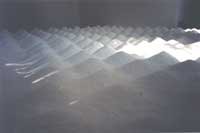
Khakim Turdyev (Uzbekistan-Holland). No Title. 1998 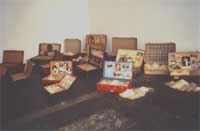 Vyatcheslav Akhunov (Uzbekistan). Nomading Barkhans. 2002 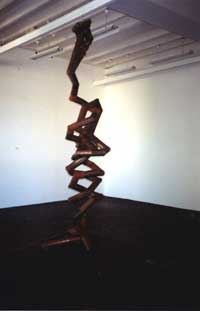 Dzhamal Usmanov (Uzbekistan). The Thirst. 2000 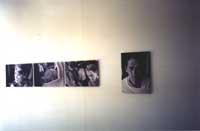 Ulan Dzhaparov
(Kyrgyzstan). Skinheaded. 2000 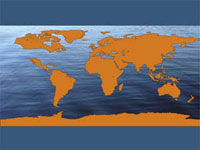 Gaukhar Kiekbaeva & Roman Arefiev (Kazakhstan). Do you believe that the USA's real? 2002 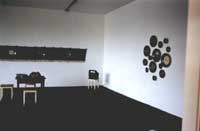
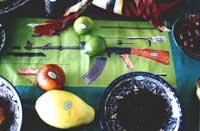 Erbosyn Meldibekov (Kazakhstan). Eastern Hospitality. 2002 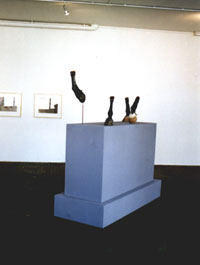 Erbosyn Meldibekov (Kazakhstan). Hero's Memorial. 2000 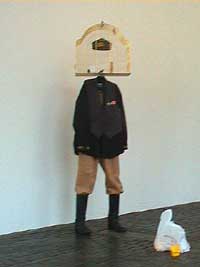 Zitta Sultanbaeva & Ablikim Akmullaev (Kazakhstan). Just in a Cage. 2001 |